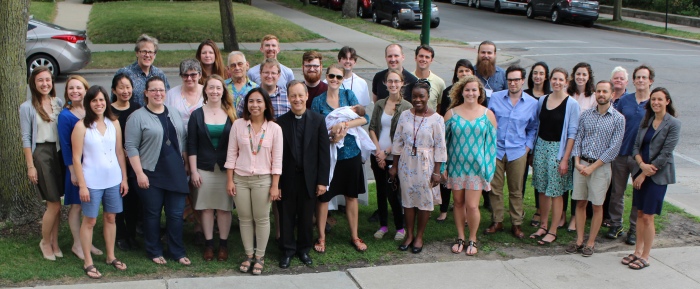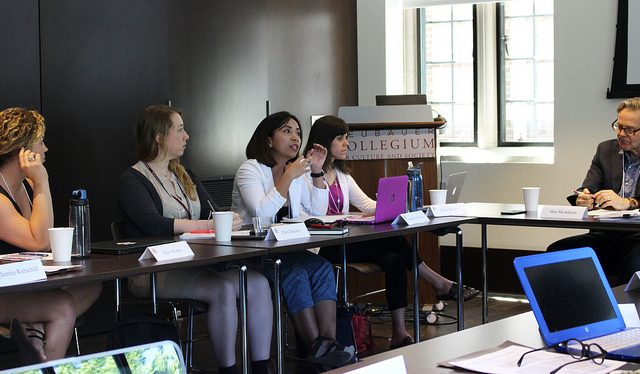
This is an excerpt of Introduction: Violence, Redemption, and the Liberal Imagination by Candace Vogler and Patchen Markell. Public Culture, Volume 15, Number 1, Winter 2003, pp. 1-10 (Article) Published by Duke University Press. The full article is available here.
Violence haunts liberal political thought. The defining image of early modern European social contract theory—and an image that remains potent in contemporary contractarian moral and political theory—locates the possibility of civil society in a compact among men who are long accustomed to the use of force in the bloody business of self-assertion and self-preservation. These men, so the story goes, surrender their right to fight one another (and to dominate the defenseless), investing a common, sovereign power with the right to command obedience for the sake of peace, justice, prosperity, and reasonable expectations of security. In turn, their consent legitimates this common power—the state—at least as long as its use of coercion serves the welfare and good future of a voluntarily toothless citizenry.
This is an image of redemption from violence. Casting the state as the bringer of peace and prosperity into a disorderly world, this picture replays, in secular terms, the Christian theme of an epochal transformation in the human condition that the Oxford English Dictionary unsurprisingly lists as the first definition of redemption: “deliverance from sin and its consequences by the atonement of Jesus Christ.” At the same time, however, this is also an image in which violence persists, though often reorganized, renamed, or repressed. While the liberal state aims to control our violent tendencies by depriving us of the right to use force against one another, it also takes into itself the right to use violence in pursuit of this goal, exemplifying the capacity of redemptive aspirations not only to suppress but also to motivate and direct the coercive use of force. And often to disguise it: when one arm of society is elevated to a position of dominance over, and putative difference from, all others, its uses of force can easily come to be euphemized—as “patient justice,” for example, something altogether different from the pathological “violence” it combats. Similarly, since the liberal state thus conceived derives its legitimacy from the lingering threat of interpersonal violence, its redemptive promise must coexist, uneasily, with a portrait of the liberal individual as a very dangerous person. Without the benefit of a coercive sovereign power holding everyone in check, the liberal individual will use any means necessary in the pursuit of material benefits, will struggle to the death for the sake of recognition, honor, or self-esteem, and can have no good reason to expect decent treatment from his fellows.
In short, even in one ideal world of liberal political imagination—a world where all questions of legitimate authority are addressed in foro interno, where no one is expected to give up anything without good reason, where superstitious dread and vainglory are banished and rational scrutiny holds sway, where each citizen can reject or accept governance and will allow considerations of peace and prosperity to decide the matter, and where every state is established for the sake of the common weal—the potential for coercion, cruelty, outrage, disorder, and brokenness are abiding aspects of social life. This seam in the liberal imagination points to the need to broaden our sense of the ways in which the terms violence and redemption are tied to each other. For example, how does the pursuit of redemption from violence relate to the pursuit of redemption through violence? Or, recalling that redemption may also refer to more mundane acts of buying back, freeing, recovering, or making recompense for some particular loss or wrong, we might wish to distinguish between redemption from violence—the radical deliverance of humanity from the affliction of violence as such—and those concrete acts of compensation and counterbalance that, in assigning meaning and value to violence suffered, enable agents to project possible futures (though not necessarily fundamentally transfigured ones) in its wake. To survive violence, to find a way forward under its weight: is this less or more radical than to dream of overcoming violence in a final, exceptional stroke?
Some of the essays collected in this special issue were originally presented in fall 2001 at a conference organized by the Late Liberalism Project at the University of Chicago’s Center for Gender Studies in conjunction with the Center for Transcultural Studies. The Late Liberalism Project was initiated in 1998 by a group of scholars from across the humanities and social sciences who shared an interest in the intersection between liberal ideas and social forms, as well as a frustration with the usual ways of approaching that intersection. Liberalism is often treated either as a set of norms or principles (typically rooted in foundational moral or political theory) or as a constellation of institutions, practices, movements, identifications, and modes of affect and desire. This is a troubling division of labor, founded on a distinction (itself greatly valued by some liberals) between the mobility of abstraction and the immobilizing grip of the concrete. Too often, this division merely sustains a tired controversy between those who celebrate the power of liberalism’s normative content to transcend its own historical limitations and those for whom the history of liberalism’s concrete social forms merely reveals the essential bankruptcy of liberal ideas. It was unclear to us that the customary ways of separating concrete from abstract matters could be sustained in the face of careful historical work on liberal forms. Moreover, the whole of the intellectual conversation about liberalism tended to focus on North American and European contexts. We wanted to open a different kind of conversation about liberalism.
Seeing ourselves as neither partisans of “the liberal project” nor its debunkers, we resolved to consider more carefully the relations among liberal ideas, liberal desires and aspirations, and liberal forms, giving special attention both to liberalism’s colonial and postcolonial contexts and to the relationship between liberalism and globalization. Through what dynamics of imagination and desire do certain institutions and practices come to represent liberal ideas? What modes of feeling and subjectivity have liberal ideas authorized, opposed, or rendered unintelligible? How are liberal ideas themselves disseminated, multiplied, or transformed through the reproduction of the social forms in which they are vested? How do emergent, alternative social forms and ideas interact with various strands or species of liberalism? Do they inflect liberal ideas and practices? Are they deflected or suffocated by them? The essays collected in this issue attend to this nexus of idea, desire, and practice across a number of different social and historical contexts. Zeroing in on the relationship between redemptive promises and the organization, experience, and effects of violence, these essays study the ways in which ethically charged political desire, both liberal and nonliberal, sometimes organizes violence and sometimes attempts to heal the breach that comes in its wake.
Read full article is available here.









